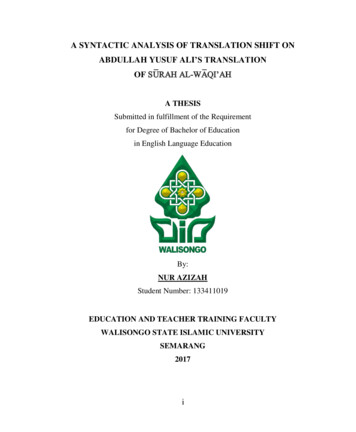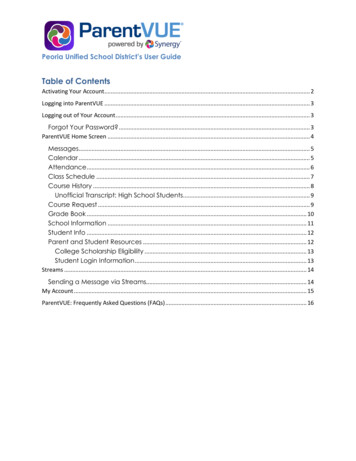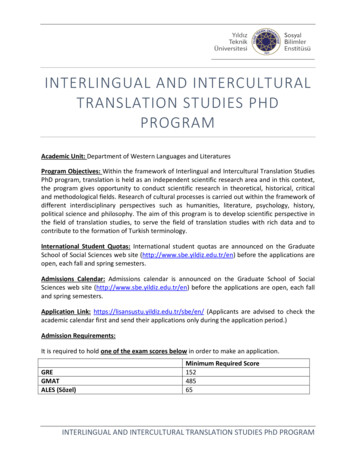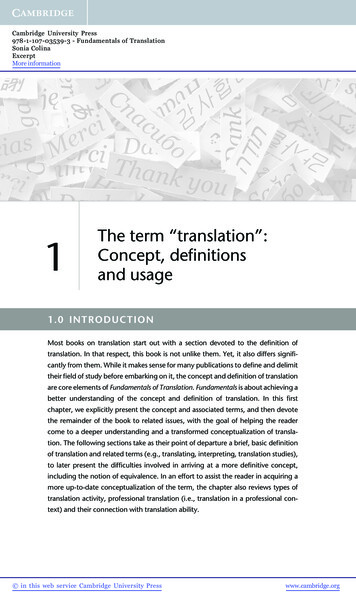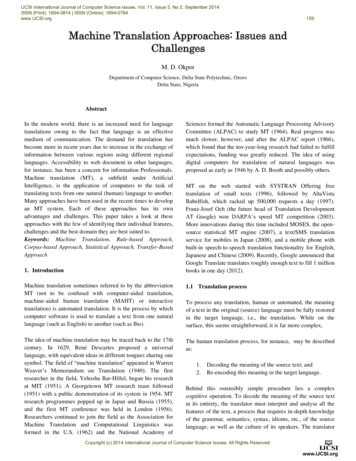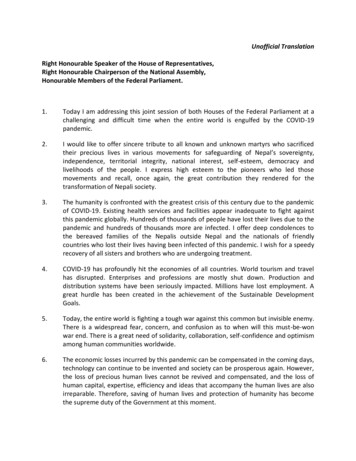
Transcription
Unofficial TranslationRight Honourable Speaker of the House of Representatives,Right Honourable Chairperson of the National Assembly,Honourable Members of the Federal Parliament.1.Today I am addressing this joint session of both Houses of the Federal Parliament at achallenging and difficult time when the entire world is engulfed by the COVID-19pandemic.2.I would like to offer sincere tribute to all known and unknown martyrs who sacrificedtheir precious lives in various movements for safeguarding of Nepal’s sovereignty,independence, territorial integrity, national interest, self-esteem, democracy andlivelihoods of the people. I express high esteem to the pioneers who led thosemovements and recall, once again, the great contribution they rendered for thetransformation of Nepali society.3.The humanity is confronted with the greatest crisis of this century due to the pandemicof COVID-19. Existing health services and facilities appear inadequate to fight againstthis pandemic globally. Hundreds of thousands of people have lost their lives due to thepandemic and hundreds of thousands more are infected. I offer deep condolences tothe bereaved families of the Nepalis outside Nepal and the nationals of friendlycountries who lost their lives having been infected of this pandemic. I wish for a speedyrecovery of all sisters and brothers who are undergoing treatment.4.COVID-19 has profoundly hit the economies of all countries. World tourism and travelhas disrupted. Enterprises and professions are mostly shut down. Production anddistribution systems have been seriously impacted. Millions have lost employment. Agreat hurdle has been created in the achievement of the Sustainable DevelopmentGoals.5.Today, the entire world is fighting a tough war against this common but invisible enemy.There is a widespread fear, concern, and confusion as to when will this must-be-wonwar end. There is a great need of solidarity, collaboration, self-confidence and optimismamong human communities worldwide.6.The economic losses incurred by this pandemic can be compensated in the coming days,technology can continue to be invented and society can be prosperous again. However,the loss of precious human lives cannot be revived and compensated, and the loss ofhuman capital, expertise, efficiency and ideas that accompany the human lives are alsoirreparable. Therefore, saving of human lives and protection of humanity has becomethe supreme duty of the Government at this moment.
7.So far, we have been able to protect human lives in Nepal due to the adoption by theGovernment of clear strategy, coordinated working method and the unity, forbearanceand cooperation of all Nepalisas soon as the infection of COVID-19 began. As we willneed further precaution, coordination and unity in the coming days to contain thespread of infection and to achieve victory over this pandemic, I call upon all to engage inthis endeavor in unity and resolutely.8.I highly admire all the public servants, including the doctors, nurses, health workers,security personnel, cleaning staff, ambulance drivers, who have rendered services fromthe frontlines in hazardous situation. I extend thanks to all individuals and organizationswho have contributed to ease the supplies of essential items. I express sincere gratitudeto all sisters and brothers for your full support and cooperation to the measuresundertaken by the Government of Nepal to prevent and control COVID-19.9.I also extend thanks to federal, provincial and local level people’s representatives,political parties, private and professional sector, media and all those who havecontributed in cash to the “Corona, Prevention, Control and Treatment Fund”. I amgrateful to the cooperation of our friendly neighbours, other friendly countries, anddevelopment partners who have extended cooperation to us even when theythemselves face a difficult situation of fighting against this worldwide pandemic.Honourable Members,10.The federal republican democracy is an achievement that we Nepali people obtainedthrough the struggle of over seven decades. This is a system consolidated by theConstitution written by the representatives that the people themselves elected.11.The democracy we have adopted is a comprehensive democracy. The system we havechosen iscompetitive, multi-party, republican political system that encompasses all basiccharacteristics of democracy.12.Comprehensive democracy further strengthens national unity through social justice,equality, social harmony and prosperity. This Government is committed to thestrengthening and development of democracy by addressing the aspirations and needsof the people according to their wishes.13.Our democracy has internalized such matters as political rights and freedoms, access torights and opportunities, social justice and equality, secured and dignified life sans fearas different dimensions of democracy. Therefore, it has established the fact thatsovereignty lies in the people and they are the real source of power. Thus, it iscomprehensive and socialism-oriented.14.Policy continuity is ensured only in political stability. Policy continuity determinescoherence in programmes and ensures their implementation. Therefore, political
stability is extremely important for the long term and unhindered development of thecountry.15.People’s mandate is honoured only in political stability. This encourages political partiesto play roles as per the popular mandate, enhances capacity of the leadership andmakes them more concerned towards the country, people and the development. Thetest of leadership’s capacity and performance during the periodic elections motivatesthe leadership to be more accountable to the people. At the end, this will strengthendemocratic system.16.For this Government, there is nothing greater than the land, nature, culture, selfesteem, pride and prosperity of Nepal and Nepali people. The Government hasconcentrated all its thoughts and deeds in total sincerity and in full capacity towards theprotection, development and utilization of Nepali land, nature, culture and people;acceleration of overall development and enhancement of the honour, dignity, selfesteem, and pride of Nepali people.17.As per the commitment to the Nepali people, the present Government is marchingahead with strong will to fulfill the national aspiration of “Prosperous Nepal, HappyNepali”. The goals and commitments put forward for the entire tenure of the presentGovernment have gradually come into implementation through the policies andprogrammes of the previous two years. The vision of the Government is clear,destination is fixed, goals are set, policies and programmes are people-centered, andthe implementation is result-oriented.18.The Government has been able to attain encouraging achievements in a short period oftwo years. The social development, physical progress and the progress recorded byNepal in more than 14 world indicators are the results of policy continuity andeffectiveness of the implementation. These achievements have laid strong foundationfor the building of a prosperous Nepal.19.Stability has been maintained in the country after the formation of the presentGovernment. The Constitution has come into full implementation. Necessary laws havebeen enacted for the implementation of fundamental rights and freedoms of thepeople, social protection and social justice, development, promotion of goodgovernance and implementation of federalism. They have come into force.20.Federal, provincial and local levels have come into operation. Plan for all-rounddevelopment of federal, provincial and local levels has been put into implementation inthe spirit of coordination and cooperative federalism. Inter-provincial Council and InterGovernmental Fiscal Council have been functional.21.Building administrative structure, human resource management and operation ofbusiness system of the provinces and local levels have been developed and put intoimplementation. Provincial and local levels have been ensured with necessary resources
by implementation of scientific fiscal transfer system. The performance of the provincesand local levels in the fight against COVID-19 has illustrated the importance of thoseentities among the people.22.The Government is actively engaged from the very beginning in the prevention andcontrol of COVID-19. By establishing a separate Fund for the mobilization of additionalresources, the Government has arranged to deposit the amount received from theGovernment, private and other sectors in that Fund and spend it for the purpose.Arrangements have been made to ensure smooth supply of medicines, food and otheressential consumer goods, including through government mechanism, during thelockdown.23.Targeted provision of incentives has been made for the industries and enterprisesimpacted by the pandemic and lockdown. Relief has been distributed through the locallevels to the poor, helpless, and indigent families, those living on daily wages and thosewho have lost jobs due to COVID-19, lockdown or any other reasons.Honourable Members,24.Our sovereignty, independence, territorial integrity, national interest, self-esteem andnational unity have been strengthened. The Government is consistently engaged instrengthening of the fundamental pillars of democratic system, such as, federaldemocratic republic, multi-party competitive polity, separation of powers, independentjudiciary, human rights, fundamental freedoms.25.The Government is committed to establish a peaceful, orderly, just, prosperous, civilizedand cultured society by making available the opportunities of basic education, health,employment, social security and protection.26.The Government has developed and expanded foreign relations in a manner thatprotects and promotes national interests on the basis of sovereign equality, mutualrespect and benefit, fulfillment of just bilateral, regional and international obligations byadhering to the Charter of the United Nations, non-alignment and five principles ofpeaceful co-existence.27.The Government is active in maintaining good governance by improving work culture ofthe public administration. In order to promote transparency and end state ofunaccountability, necessary policy, legal and institutional improvements have beeninitiated. Peace and order has been maintained. Quality of public service delivery hasbeen enhanced. By establishing the fact that anyone involved in corruption relatedactivity would not get immunity from punishment, actions against corruption have beenaccelerated. The task for revival with modernity of the culture and civilization is movingahead.
28.The Government is determined to realize Sustainable Development Goals before 2030and achieve the goal of attaining the status of a middle income country. Economic andsocial development plans and programmes have been initiated to graduate from theLDC status within this tenure of the Government and to attain the level of a developedcountry by 2099.29.Our declared aspiration of transforming the landlocked Nepal into a land-linked countryhas been fulfilled. Construction of large infrastructure projects with modern technology,including road, railway, airport, drinking water and irrigation, has been rapidly movingahead. The Government’s commitment to end the painful and perilous crossing by Tuinshas been achieved.30.The policy of exploring, exploiting, processing and utilizing the mineral and petroleumproducts identified in different parts of the country has been initiated. The policies ofproducing 15 thousand megawatts of electricity in ten years, increasing domesticconsumption, extension of transmission lines and strengthening of distribution systemare under implementation. Infrastructures are being built for international trade ofelectricity.31.A large amount of investment is being made in agriculture infrastructure along with theplan of modernization and commercialization of agriculture in order to double theagricultural productivity in 10 years. Social protection programmes have been initiatedto include all the Nepalis in the social security system.32.The measurement of living standard only on the basis of average of the statistics ofincome of prosperous and impoverished cannot reflect the real picture of prosperity,happiness and joy. Therefore, prosperity should not be measured only on the basis ofgross domestic product or per capita income. The government believes that societyshould be upgraded from the bottom and importance should be given to human dignityand existence.33.This government is sensitive that no one should be left behind in society. In two years’time, cities have been freed from street children, street people and beggars. Nepal hasachieved a great success in uplifting Nepali civilization one more step in terms ofavailability and improvement in the use of toilets in South Asia.34.Performance contract and monitoring of the monitors have been started for theeffective implementation of works initiated through policy and programme in order tomake the people empowered and capable.35.In the past two years, our economic growth was increasing rapidly with the goal ofattaining double digits. Major indicators of socio-economic development wereencouraging. While the Government was moving ahead on the impetus of theseachievements, the country has now come under the grip of COVID-19 pandemic. It hascreated hurdles on the course of the Government to move ahead with its goals, plans
and desired pace; our aspiration and speed of development has been impeded. TheGovernment’s priorities have changed due to the pandemic. Now, our orientation willbe towards health, education, employment and economic recovery.Honourable Members,36.To realizenational aspiration of‘Prosperous Nepal, Happy Nepali’by addressing theadverse impacts of the pandemic in the overall socio-economic sectors, the Governmentof Nepal has formulated the policies and programmes for the fiscal year 2077/78B.S.,taking into consideration the following strategic foundation and considerations:a. Mobilize maximum internal resources keeping in view the prospects of changes inthe global economic structure, decrease in income of countries and the possibilityof changesin the capacity, prioritization and sectors of resource mobilizationof ourfriendly countries and development partners;b. Make Nepal’s economy productive and strongto successfully manage the risks in asituationwhere most of the countries’ economic growth is likely to be in negative;c. Continue and accelerate economic activities, agricultural and industrialproduction, employment generation, productive sectors, development works andsocial life, while avoiding further damages in these sectors;d. Distribute equitably the economic gains and fruits of the development;e. Build a healthy, educated,just and progressive social life by implementing variousprogrammes and ensuring quality service delivery in health, education, genderequality and other social and cultural sectors;f. Complete within the given time-frames and cost-estimatesof the game-changerand other sectoral as well as national-level programmes and projects initiated bythe Government for the overall and balanced development of the country;g. Reprioritizeprogrammes and projects, checkredundant and unproductiveexpenses, maintain fiscal discipline, concentrate investment in productive andemployment generating sectors;h. Transform the risks of loss of foreign employment arising from contraction ininternational labour market into opportunities for employment creation within thecountry, development of a self-reliant economy, and strengthening of nationalcapacity;i.37.Control corruption, improveservice delivery, strengthen law and order andpromotegood governance;The Government’s foremost priority has been to get rid of COVID-19 from Nepal. TheGovernment will implement and enforce health-awareness measures necessary toprevent the pandemic, expand the testing for infection; ensure adequate provisions andmobilization of medicines, equipment and health workers, including doctors. The
Government is resolutelydedicated to create a situation where no one will lose life dueto the pandemic within Nepal.38.The Government is studying the effects of the pandemic in all the sectors of the nationallife including social and economic. Based on the study, the Government will adopt thepolicy to further enhance the effectiveness of the state machineries to resume internalmobility and supply system, improve quality of health and education services, increaseagriculture and industrial output and speed up development works.39.Special sectoral programmes will be launched by preparing additional post-COVID-19strategies and action plan. Special programmes related to health, education, skilldevelopment training and employment generation will be implemented targeting theworkers who have lost their jobs, small farmers, destitute, poor and indigentfamilies.40.In the event the pandemic continues for an uncertain period, the Government, whiletaking additional effective measures to prevent it, will mobilize resources by reprioritizing and readjusting the programmes. The Government will work with addedresolve in its campaign to achieve the aspiration for ‘Prosperous Nepal, Happy Nepali’even in this adverse climate in which we have to fight this pandemic.Honourable Members,41.This Government will runprogrammes to ensure equitable access for all Nepali people toservices for quality health, education, drinking water and sanitation. Necessaryinfrastructures will be developed to provide international standard education andmedical treatment within the country. The Government will further reinforce the role ofpublic sector in education and health services while providing incentives to the privatesector to increase their investment.42.The Government will restructure the health sector in the next fiscal year with theobjective of establishing and upgrading health institutions, developing infrastructures,provisioning ofhuman resources and enhancing equitable access to services andincreasing its quality.43.Building a healthy Nepal is thefundamentalhealth policy of the Government. Preventiveprogrammes will be launched to enhance immunity of the people by promoting naturefriendly and healthy life-style. Preventive and curative methods will be adopted inhealth services.44.The Government has declared availability of comprehensive immunization services in671 local-level wards across the country. Such services will be made available in theremaining wards of all local-level governments in the next fiscal year.45.The Government has built infrastructures and ensured health services in additional 2626wards of local governments where basic health services were not available. Quality of
services of health institutions of ward-level local governments will be enhanced in thenext fiscal year. Based on geography and population, a primary hospital will beestablished or upgraded up to the capacity of 5 to 15 beds in each local-levelgovernment.46.Existing district hospitals at provincial level will be upgraded up to the capacity 25 to 50beds, and zonal hospitals will be upgraded to 200 bed general hospitals.47.The Government is expanding and upgrading specialized medical services available atInstitutes of Health Sciences in Pokhara and Karnali; and the hospitals in Koshi,Narayani, Bharatpur, Bheri and Dadeldhura. These central-level hospitals will bedeveloped as 500 bed specialist hospitals.48.In order to prevent, control and treat infectious diseases and to prepare and respondtohealth disasters management, well-equipped modern infectious disease hospitals withnecessary laboratory testing facilities will be established one at central level at thecapacity of 300 beds and one each at provincial level atthe minimum capacityof 50 beds.49.Primary level emergency health services from all central hospitals will be provided freeof cost to the people from the poor and disadvantaged section.50.Health schemes aimed at prevention, diagnosis, testing, and treatment of diseases suchas high-blood pressure, diabetics, cancer, asthma, kidney, liver and uterus prolapses willbe made more effective country-wide. Provisions will be made at ward-level servicecenters to ensure medical screening of people above 40 years of age for blood pressure,albumin and diabetics.51.Ayurvedic, Yunani, Homeopathy and naturopathy treatment systems will be expandedand promoted. General public will be encouraged to adopt a healthy life-styleincorporating yoga and physical exercises. Establishment of gym halls, wellness centersand yoga centers at local-level wards will be encouraged.52.Necessary provisions will be made to run an integrated ambulance services ensuringeasy and simplified process for the public by dialing a three-digit number fromanywhere in the country. Trauma centers will be expanded along the major highways.53.Liver transplant service has made operational at Tribhuban University Teaching Hospital,Maharajgunj. Nephrology and urology centers will be established in this hospital in thenext fiscal year. These services will gradually be expanded to all provinces.54.Kanti Children’s Hospital will be developed as a center of excellence for higher studies indifferent disciplines of pediatrics. Institutional arrangements will be made for diagnosis,testing and treatment of children’s heart diseases at Manamohan CardiothoracicVascular and Transplant Center and Shahid Gangalal National Heart Center. Services atParopakar Maternity and Gynecology Hospital will be further specialized.
55.Provisions will be made for all medical colleges to give medical services, includingsurgical services, at least in one hospital in a district, and all medical institutions toconduct at least a one-day satellite clinic once in a month. Arrangements will be madefor central hospitals to regularly run satellite hospital in designated place.56.Arrangements will be made at all hospitals for providing, to the extent possible,maximum health servicesduring disasters and epidemic situations.57.A separate Center for Disease Control will be established to prevent and controldiseases. Another institute with the name of Food and Drug Administration will becreated to test and regulate the quality including that of medicines, tools andequipment. National Health Accreditation Authority will be instituted to test andaccredit quality of health institutes and health services.58.A sectoral integrated umbrella act will be formulated to make commission, academy,council, research center and hospitals in the health sector moreeconomic, systematizedand effective.59.Modern health desks and quarantine homes will be established at the internationalairport and major international border points.60.More than 2.7 million citizens have been covered by medical insurance under theMedical Insurance Programme run in 551 local governments. The programme will beexpanded to cover all citizens within next three years. Additional services beyond thebasic medical services will be gradually incorporated under the Medical InsuranceProgramme.61.Birendra Military Hospital will be upgraded with facilities to enable it to provide all kindsof treatments, including mass-casualty patients, in the event of emergency situation.Honourable Members,62.The education policy of this Government is to educate all Nepalis to bepatriotic,optimistic towards future, civilized, cultured, qualified, competent, entrepreneurial,creative, and self-confident citizens. Sector-wise human resources will be developed byprojecting the human resource need; keeping in view the opportunities available atnational and international levels. National qualification framework will be implemented.63.Nepal will be declared a literate country within next fiscal year.64.Nepal is in need of adequate expert manpower in development works and social sector.In order to develop trained manpower, provisions will be made to provide highereducation in the specialized subjects such as agriculture and forest, environment,science and technology, medicine, Ayurveda, tourism, engineering, artificial intelligence,tunnel technology and rock engineering, mining exploration, hydroelectricity andrenewable energy.
65.University’s teaching and learning process will be made research based. Science andtechnology related higher education will be made research oriented. Mechanism will bedeveloped to ensure the quality of research.66.Necessary physical infrastructure for the establishment and operation of MadanBhandari Science and Technology University will be taken forward expeditiously with aview to establish it as a university capable of carrying out study, teaching and researchof international standard in science and technology within the country.67.The academic quality of the Tribhuwan University will be enhanced through structuraland other necessary reforms. The curriculum of the University will be updated. All theresearch centres under this University will be strengthened and developed asspecialized research centres.68.Necessary preparation will be completed for the establishment and operation of MadanBhandari Techno-Industrial University and Yogmaya Ayurvedic University.69.Graduate youths will be mobilized throughout the country in development works andeducational development activities through “know our own soil; build our owncountry” campaign.70.In the past two years, the two hundred and seventy thousand out-of- school childrenhave been enrolled in the schools. All school-age children will be ensured to be enrolledin the school. "Let's bring the children to the school and retain them in study"programme will be made more effective to ensure completion of at least secondarylevel education.71.Physical infrastructure and learning facilities of the educational institutions will beimproved through President Educational Reform Programme. Activities includingscientific research, technology development and innovation, and incentives to thetalents will be included in this programme. Investment will be enhanced by creatingconducive environment for the development and expansion of new technology andknowledge creation.72.Public schools will be made as the centers of quality education. Campaign for the PublicSchools Strengthening Decade (2076-85 B.S.) will be launched for the overall reforms ofthe public schools. Mapping of schools and educational institutions will be carried out tobring about adjustment based on geography and minimum student number. Qualified,competent and committed teachers will be supplied, developed and mobilized in theschools for quality education.73.Emphasis will be laid on the scientific teaching methods to make science educationeffective and interesting at the school level. Science study centers will be established.
74.Technical education will be expanded to avoid the shortage of technical manpower.Technical and vocational education has been expanded in six hundred and seven locallevels across Nepal. In three years, all community schools and vocational educationcentres will be developed as educational institutions equipped with necessaryinfrastructures.75.Subjects pertaining to Nepal's pride, culture, civilization, values and norms, fostering ofnational unity and the understanding of the duties of the citizens will be incorporated inschool-level curricula.76.Local levels will be encouraged to launch elementary child development programmesfor the all-round development of children under five years of age.77.Arrangements will be made to impart online education through the production of elearning materials. Information Technology laboratory and high-speed internet facilitieswill be made available in all public secondary schools and campuses.78.National Education Policy, 2076 and National Science and Innovation Policy, 2076 will beimplemented by making timely amendments.Honourable Members,79.The fundamental labour policy of this government will be labour management thatincludes skilled workers, dignity of job, self-employment, fair wages and socialprotection. Healthy citizen, technology-based quality education, production-friendlyfiscal system and entrepreneurial environment are the cornerstones of employment.The government will create massive employment opportunities through thedevelopment and utilization of these foundations.80.At a time when the domestic employment opportunities are scant, the global pandemicof covid-19 is likely to engender the risk of increasing number of unemployment in thecountry due to the contraction of employment opportunities at home and the possibilityof the return of Nepalese migrant workers from abroad. The expected number ofunemployed will be mobilized in the sectors of agriculture, large physicalinfrastructures, local infrastructures, small and medium enterprises, manufacturingindustries, construction and services.81.The programmes of the Council for the Technical Education and Vocational Training aswell as those of all agencies related to labour and skill development will beimplemented in an integrated manner to address the shortage of skilled and qualifiedworkers. Short-term mobile trainings will be conducted in all local levels as necessary.82.Start-up funds will be provided to the innovative youths and other entrepreneursincluding the experienced and skilled enterprising youths who have returned fromforeign employment to start their own businesses. Entrepreneurial activities will be tied
to capacity development, technology transfer, financial access and marketizationprogrammes. For this, the ongoing programmes will be restructured to expand them toall provinces.83.Educated unemployed youths will be encouraged to start businesses in their areas ofstudies wherever possible by providing project-based start-up funds even on the basis oftheir educational certificates and also by supporting in the project formulation.84.The Prime Minister Employment Programme
16. For this Government, there is nothing greater than the land, nature, culture, self-esteem, pride and prosperity of Nepal and Nepali people. The Government has . strengthening of the fundamental pillars of democratic system, such as, federal democratic republic, multi-party competitive polity, separation of powers, independent .
